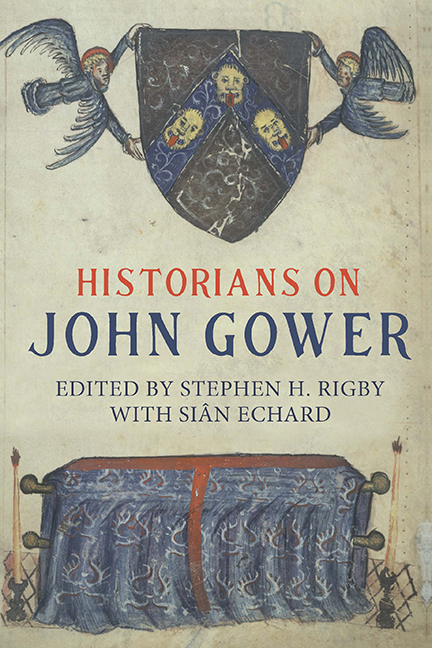Book contents
- Frontmatter
- Dedication
- Contents
- List of Illustrations
- Notes on Editors and Contributors
- Acknowledgements
- List of Abbreviations
- A Note on the References
- Preface: Gower in Context
- PART I Gower’s Life and Works
- PART II GOWER AND LAY SOCIETY
- PART III GOWER AND THE CHURCH
- PART IV GOWER AND GENDER
- PART V GOWER AND POLITICS
- PART VI GOWER AND COSMOGRAPHY
- Select Bibliography
- Index
- VOLUMES ALREADY PUBLISHED
12 - Political Theory
Published online by Cambridge University Press: 26 May 2022
- Frontmatter
- Dedication
- Contents
- List of Illustrations
- Notes on Editors and Contributors
- Acknowledgements
- List of Abbreviations
- A Note on the References
- Preface: Gower in Context
- PART I Gower’s Life and Works
- PART II GOWER AND LAY SOCIETY
- PART III GOWER AND THE CHURCH
- PART IV GOWER AND GENDER
- PART V GOWER AND POLITICS
- PART VI GOWER AND COSMOGRAPHY
- Select Bibliography
- Index
- VOLUMES ALREADY PUBLISHED
Summary
‘Absolutist’ versus ‘Constitutionalist’ Gower
At one time, partly due to the influence of K. B. McFarlane's work on the English nobility, studies of late medieval English political life tended to focus on the private concerns, personal connections and individual interests of the king, magnates and gentry and, above all, on competition for patronage. As a result, the role of ideas and values as causes of political action was often neglected, even though McFarlane himself warned against seeing medieval political choices as being entirely venal in their motivation. More recently, however, historians have emphasised the significance of ideas and values within late medieval politics and have turned their attention to the political language of the period. Following Quentin Skinner's view of normative language as constituting one of the ‘determinants’ of political action, ‘new constitutionalist’ historians such as Christine Carpenter, Edward Powell and John Watts have presented the political principles which were available in late medieval England as being one of the determinants of the range of actions that was available to political agents, not least by constraining their freedom of manoeuvre in their attempts to justify themselves and to win the support of others. In the words of Laura Slater, political thought should be seen as ‘a motivating force or explanatory principle for political action, and as a determining influence on its outcome’. As Michael Bennett said, despite the central part played by the Lancastrian and other magnate affinities in bringing about the deposition of Richard II, if we are to understand the ‘revolution’ of 1399, it is also ‘necessary to take seriously the role of ideas’. Here both abstract theory, including the Aristotelian definition of tyranny, as well as more everyday assumptions about the relationship between the king and the political community, such as the belief that the monarch's will was limited by the common law and by his subjects’ property rights, were key factors in generating opposition to Richard II. This renewed focus on the role of ideas in political life has led historians to study not only the language found in factional manifestos, parliamentary petitions and mirrors for princes but also that which was used in political songs and – of particular importance in our context – in public poetry and imaginative literature.
- Type
- Chapter
- Information
- Historians on John Gower , pp. 381 - 424Publisher: Boydell & BrewerPrint publication year: 2019



